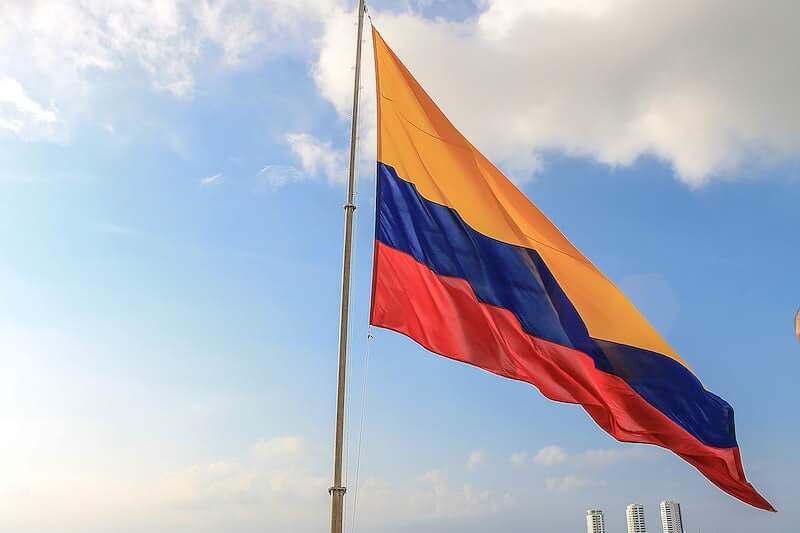
Free Colombia flag photo, public domain banner CC0 image.
Corporación Colectiva Justicia Mujer (CCJM) and Lawyers Without Borders Canada (LWBC) join the commemoration of the National Day for the Dignity of Women Victims of Sexual Violence in the context of the armed conflict.
CCJM and LWBC join the protection of the rights to truth, justice, reparation and guarantee of non-repetition for the surviving victims. We request the Special Jurisdiction for Peace (Jurisdicción Especial para la Paz, JEP) to open a national case on sexual and reproductive violence and other gender-based crimes and the Mayor’s Office of Medellin to strengthen the public policy on victims from a gender and differential approach.
At the national level, the CCJM participates and represents women in case 004, regarding the region of Urabá and Bajo Atrato before the JEP. Likewise, in Medellin, the CCJM and LWBC have worked to promote the creation of the first gender subcommittee with a differential approach to transitional justice in the country.
In 2018, the CCJM and the Corporación para la Vida Mujeres que Crean, with the support of LWBC, implemented strategic litigation as a way to go forward in improving the conditions of women survivor victims, and filed a tutela action against 7 public entities. Through a tutela ruling, the entities were ordered to guarantee the rights of 5 women victims of multiple forms of violence, including sexual violence more than 9 times as part of the armed conflict.
As a result of this litigation and advocacy strategy, the Subcommittee on Gender with a Differential Approach to Transitional Justice of Medellin was created to overcome the deficit in women’s rights within the framework of the city’s comprehensive policy of attention and reparation for victims.
This panorama is accompanied by the declaration of the Constitutional Court, which through sentence 588 of 2019 decided to extend for another 10 years the validity of Law 1448 of 2011 – the Victims Law, as part of the guarantees for victims. “The Court has found that, if Law 1448 of 2011 disappears without a replacement formula, serious consequences could arise for the rights of victims”, especially the guarantees of the rights to truth, justice and non-repetition for women, LGBTI persons and various population groups, victims of the armed conflict, could be affected.
So that these victimizing acts do not persist in impunity, the CCJM and LWBC adhere to the request of journalist Jineth Bedoya and other survivors and organizations regarding the opening of a national case on sexual and reproductive violence and other gender-based crimes. In this case, victims from regions not prioritized in the territorial macro-cases could participate, in order to address the various forms of sexual violence in an autonomous manner, as particularly serious and reprehensible and seeking to guarantee the rights to truth, justice, reparation and non-repetition of all women and LGBTI victims and survivors of the armed conflict. Also, the request for the improvement of the public policy on victims, especially the strengthening of the Gender Subcommittee with a Differential Approach in Medellin, as a national reference and guarantee of inclusion of women’s needs.
The 25M as a reparation measure with collective impact
Since May 25, 2014, this day has been commemorated in Colombia, as a measure of reparation by the Colombian State in response to the request of journalist Jineth Bedoya Lima.
On May 25, 2000, Jineth was sexually assaulted in the exercise of her journalistic work in events that remain unpunished to this day. For this reason, and as a response to her constant struggle, her case is currently before the Inter-American Court of Human Rights, due to the impunity of the investigation and prosecution of the material and intellectual authors of the case.
Sexual violence in figures
Impunity rates for crimes related to sexual violence in the context of the armed conflict are a constant. According to the Follow-Up Committee to Constitutional Court orders 092 and 009 on sexual violence, impunity in these cases exceeds 90%. To this is added the lack of charges and underreporting of the facts; according to UN estimates, in a study of 19 countries that includes Colombia, by 2016 for every registered case of sexual violence occurred in the armed conflict there were between 10 and 20 unregistered cases. Thus, sexual violence is characterized not only by the generality of its occurrence but also by the silence that follows, the lack of charges due to fear, shame, institutional distrust and other associated factors.
Even with this data gap, the National Information Network of the Unit for the Attention and Integral Reparation of Victims records show that at least 26,994 women have been victims of crimes against sexual freedom and integrity between 1985 and 2020. In this regard, the Constitutional Court has pointed out that sexual violence has been a habitual, widespread, systematic and invisible practice in the context of the Colombian armed conflict that generates multiple damages (C-781 of 2012).